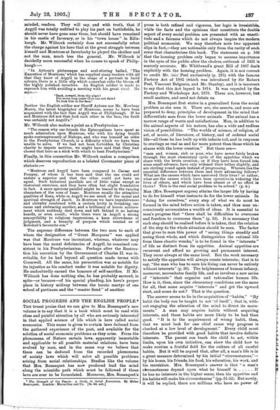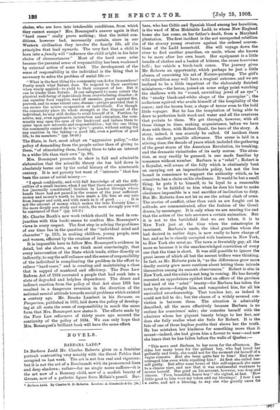SOCIAL PROGRESS AND THE ENGLISH PEOPLE.* THE truest praise that
we can give to Mrs. Bosanquet's new volume is to say that it is a book which must be read with close and painful attention by all who are seriously interested in that applied science of life which is here called social economics. This name is given to certain laws deduced from the gathered experience of the past, and available for the solution of social economic problems as they arise. From the phenomena of Nature certain laws, apparently immutable and applicable to all possible material relations, have been evolved by man, and in the same way we believe that there can be deduced from the recorded phenomena of society laws which will solve all possible problems arising from social. relationships. Studies like the volume that Mrs. Bosanquet has now produced lead the mind along the scientific path which must be followed if those laws are ever to be formulated. Moreover, Mrs. Bosanquet's • The Strength of the Pearls: a Study in Social Economics. By .J.Ichou Bosanquet. London Macmillan and CO. is.. 6d. net.]
prose is both refined and vigorous, her logic is irresistible, while the facts and the opinions that constitute the double aspect of every social problem are presented with an exacti- tude and a fairness which do not always inspire the modern political economist. We may therefore note two apparent slips in fact,—they are noticeable only from the rarity of such error that characterises this book. The statement on p. 166 that the housing problem only began to assume importance in the eyes of the public after the cholera outbreak of 1831 is scarcely accurate. Mr. Whitbread's great Bill of 1807 dealt explicitly with the housing problem. Again, it is not correct to credit Mr. (sic) Peel exclusively (p. 215) with the famous
Factory Act of 1802 (which was introduced by Sir Robert Peel, Viscount Belgrave, and Mr. Stanley), and it is incorrect
to say that this Act lapsed in 1814. It was repealed by the Factory and Workshops Act, 1878. These are, however, but small matters, and need not detain us.
Mrs. Bosanquet first states in a generalised form the social
problem as she sees it. There are, she asserts, and none are prepared to deny, principles of development in the mind that differentiate scan from the lower animals. .The animal has a
narrow range of wants and satisfactions. Man, in addition to the animal aspects of his nature, has also a wide and endless vision of possibilities. " The worlds of science, of religion, of art, of music, of literature, of history, and of ordered social
life—all these he has built up with infinite toil, and in response to cravings as real as and far more potent than those which he
shares with the lower creation." But there are-
" men and women, rich or poor, who have never fairly broken through the most elementary cycle of the appetites which we share with the brute creation ; or if they have been forced into some small advance, have only widened their tether slightly, and are circling round again instead of progressing. Wherein lies the essential difference between them and their advancing fellows ? What 'are the causes which have narrowed their lives ? or rather, what are the causes which have been operative in widening the lives of others, and which have been absent or of no effect in theirs ? This is the real social problem to be solved." (p. 9.) Man (Mrs. Bosanquet argues) attains the larger life by having to do for himself what instincts do for the lower animals. In " doing for ourselves," every step of what we do must be formed in the mind before action is taken, and thus man un-
consciously accumulates a wealth of ideas. It is essential to man's progress that " there shall be difficulties to overcome and freedom to overcome them" (p. 19). It is necessary that each step should be realised before it is taken, that the relation of the step to the whole situation should be seen. The factor that gives to man this power of " seeing things steadily and seeing them whole, and which distinguishes the rational life from these chaotic wrecks," is to be found in the " interests " of life as distinct from its appetites. Animal appetites are recurrent and afford no growing and permanent interest. They recur always at the same level. But the work necessary to satisfy the appetites will always create interests ; that is to say, "the man who has to earn his living can never be entirely
without interests" (p. 30). The helplessness of human infancy, moreover, necessitates family life, and so involves a new series of " interests " that organise and rationalise human life. How is it, then, since the elementary conditions are the same for all, that some acquire "interests " and get the upward start, and some do not ? That is the question.
The answer seems to lie in the acquisition of "habits." "By habit the body can be taught to act of itself ' ; that is, with- out engaging the attention of the mind to direct its move- ments." A man may acquire habits without acquiring interests, and these habits are more likely to be bad than good. " It is to the acquirement of wrong habit, then, that we must look for one chief cause why progress is checked at a low level of development." Every child must therefore be provided with good habits that involve definite interests. The parent can teach the child to act, within limits, upon his own initiative,. can show the child bow to make routine a fruitful field for the culture of all careful habits. But it will be argued that, after all, a man's life is in
a great measure determined by his initial " circumstances,"— by his home, his friends, his food, his education, his work, and
his recreation. Mrs. Bosanquet's answer is that " a man's
circumstances depend upon what he himself is If he has no interests in the higher sense, then his appetites and his habits will make his circumstances" (pp. 51-52). But surely, it will be replied, there are millions who have no power of
choice, who are born into intolerable conditions, from which they cannot escape ? Mrs. Bosanquet's answer again is that
"hard cases" really prove nothing; that the initial con- ditions, however bad, necessarily contain, since in our Western civilisation they involve the family life, all the
principles that lead upwards. The very fact that a child is born into a family will " influence the child aright in his later
choice of circumstances." Most of the hard cases arise because the parental sense of responsibility has been weakened by external action of some kind. The development of the sense of responsibility in the individual is the thing that is necessary to solve the problem of social life :-
" What is the best thing the community can do for its members? Pretty much what Nature does. To respond to their exertions
when wisely applied—to yield to their conquest of her. But it can be kinder than Nature. It can safeguard to some extent the physical well-being of individuals from overwhelming disaster ; it can equalise food supplies, ward off enemies, guard against fire, prevent, and to some extent cure, disease—always provided that it can secure the active co-operation of individuals. For though the community place its whole strength at the disposal of the individual, he may still decline to avail himself of it. Further, by active, nay, even aggressive, instruction and education, the com- munity may open the eyes of the backward and induce them to enter upon new interests and responsibilities ; but the one thing the community cannot do is to give'—gratis, without asking for any exertion in the taking—a good life, even a portion of good life, to its members." (pp. 58-59.)
The State, in fact, must adopt an "aggressive policy,"—the policy of demanding from the people rather than of giving to them, "of stimulating them, forcing them to take an interest in a wider life than their own " (p. 98).
Mrs. Bosanquet proceeds to show in full and admirable elaboration that the scientific theory she has laid down is absolutely borne out by the social history of the nineteenth century. It is not poverty but want of interests " that has been the cause of social misery :—
" I speak confidently, and with full knowledge of all the diffi- culties of a small income, when I say that there are comparatively few [normally constituted] families in London through whose hands there had not passed in the course of the year sufficient money and money's worth to have made a life free at any rate from hunger and cold, and with much in it of good It is not the amount of money which makes the true Poverty Line— the more deeply you study and watch, the more strongly you will be convinced of that." (pp. 101-2.)
Mr. Charles Booth's new work (which should be read in con- junction with this book) seems to confirm Mrs. Bosanquet's views in every respect. The first step in solving the problems of our time lies in the question of the "individual mind and character" (p. 113), in making children, young people, men and women, efficient by the creation of interests.
It is impossible here to follow Mrs. Bosanquet's evidence in detail, but she shows, as we think most convincingly, that every intervention of the State which tends, either directly or indirectly, to sap the self-reliance and the sense of responsibility of the individual is complicating the problem in the effort to relieve "hard cases," and is creating and maintaining a class that is sapped of manhood and efficiency. The Poor Law Reform Act of 1834 recreated a people that had sunk into a state of degraded and helpless dependence. The direct and indirect reaction from the policy of that Act since 1891 has resulted in a dangerous reversion in the direction of the national mental attitude towards social problems which existed a century ago. Mr. Brooke Lambert in his Sermons on Pauperism, published in 1871, laid down the policy of develop- ing at all costs the sense of responsibility in much the same form that Mrs. Bosanquet now states it. The efforts made by the Poor Law reformers of thirty years ago secured the continuity of the policy of 1834. We can only hope that Mrs. Bosanquet's brilliant book will have the same effect.







































 Previous page
Previous page